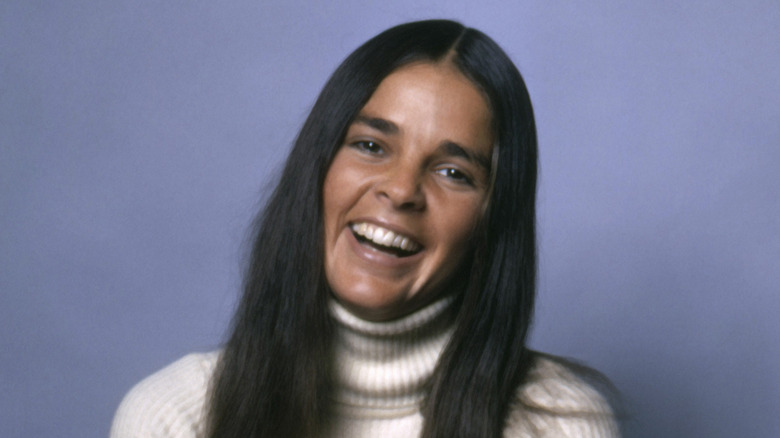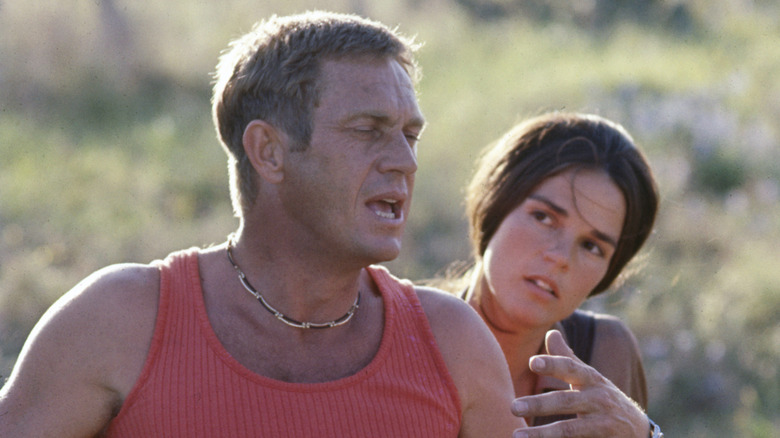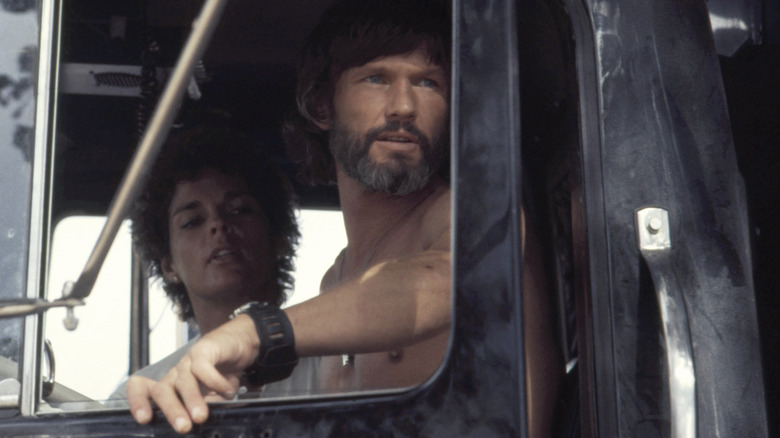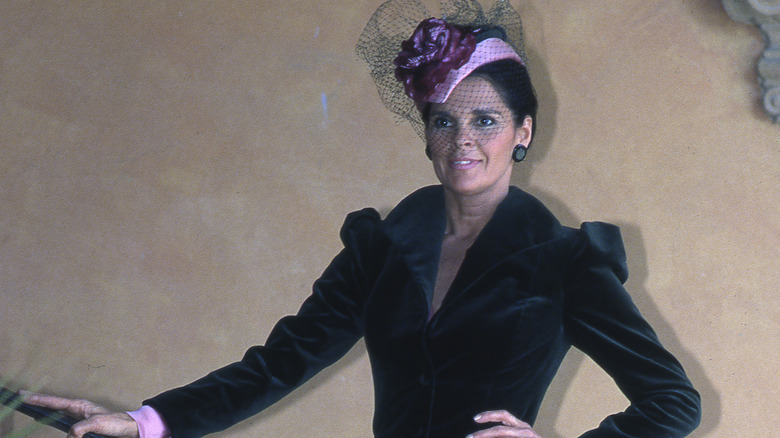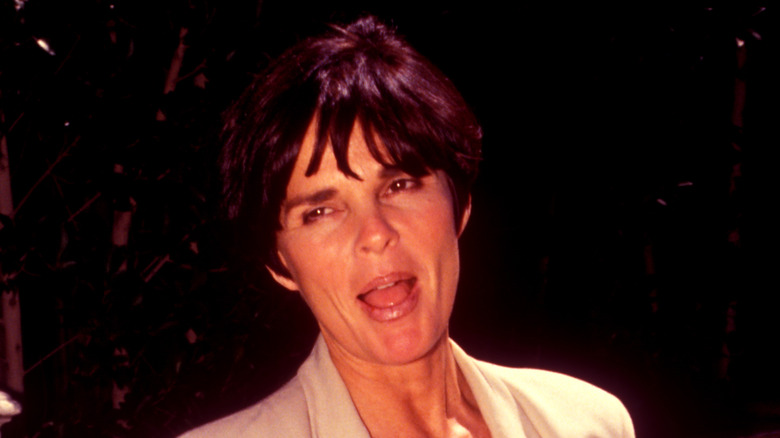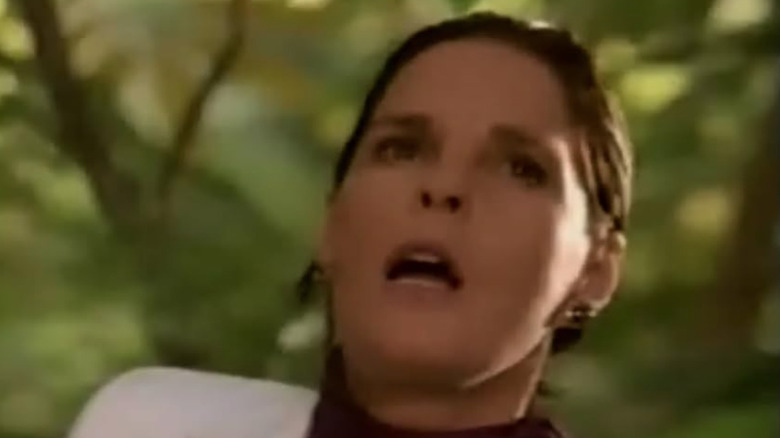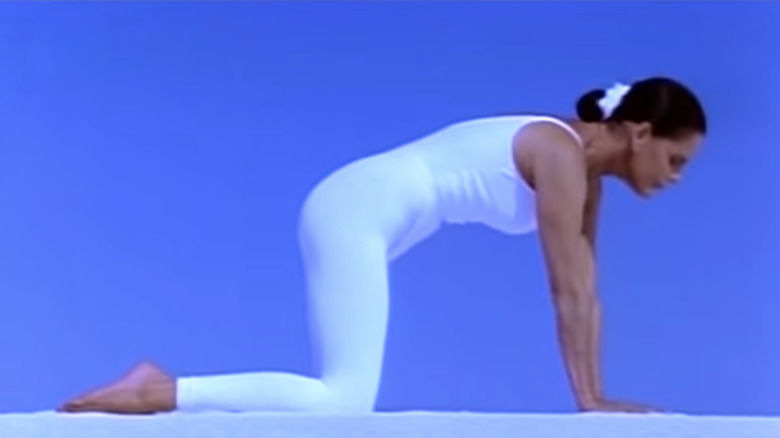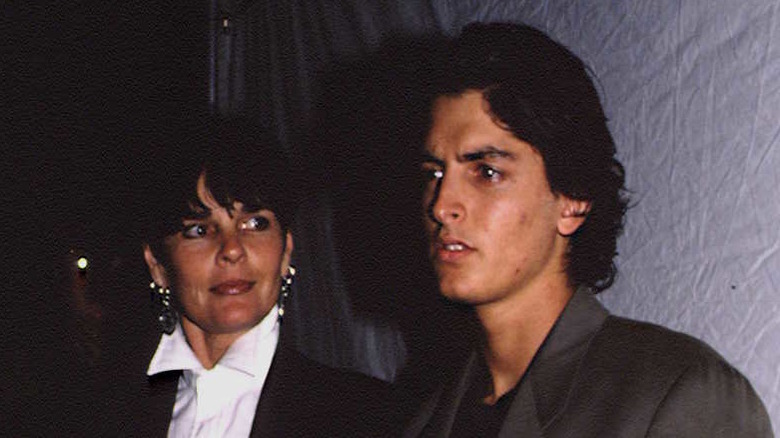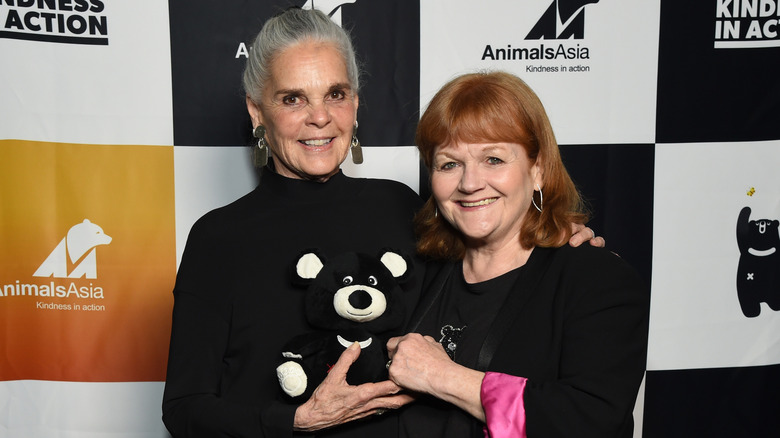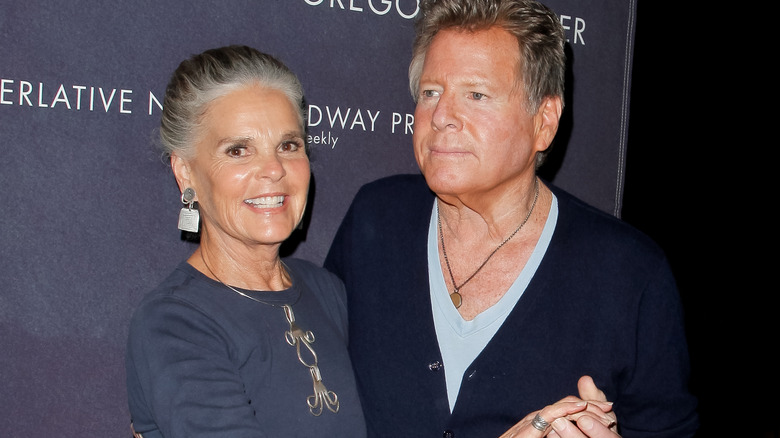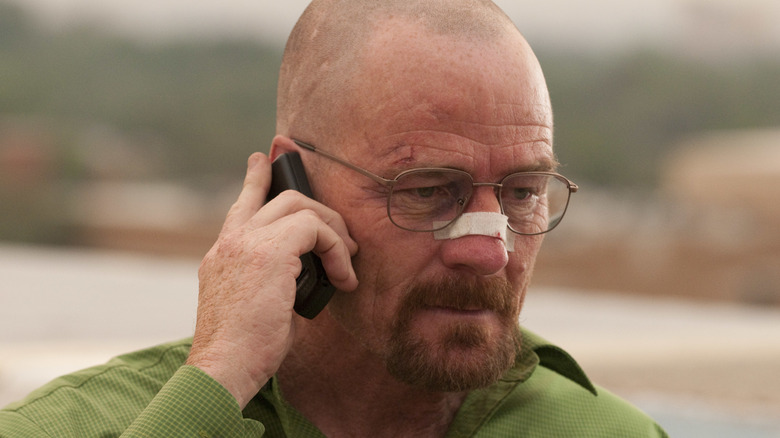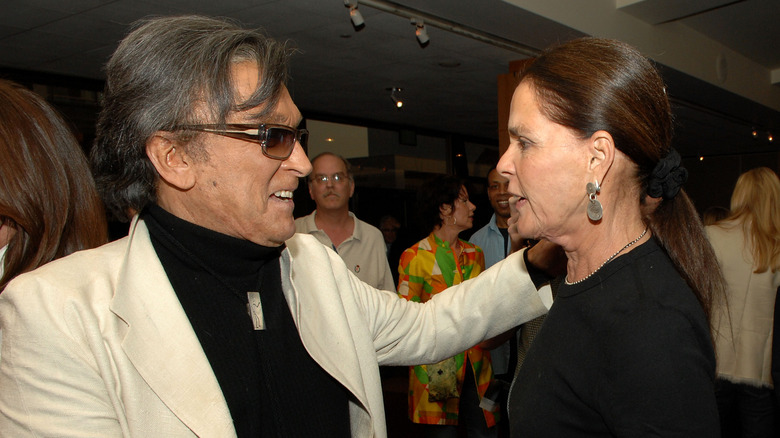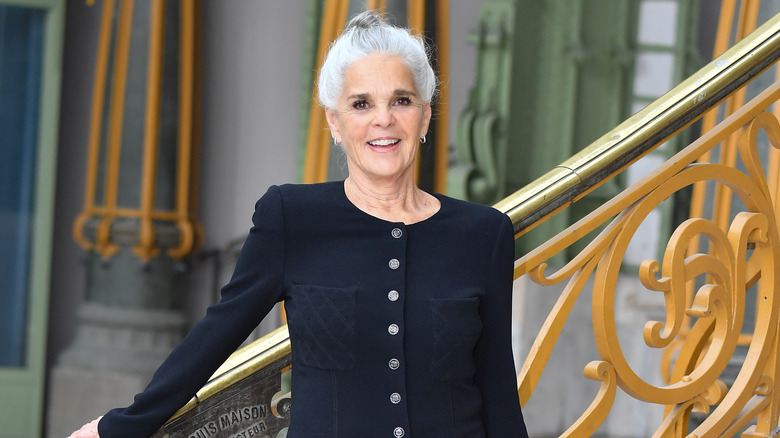Whatever Happened To Ali MacGraw?
Few actors have shot to stardom as quickly as Ali MacGraw did in the 1970s, only to disappear just as quickly. A former model and photography assistant, MacGraw turned to acting in the late 1960s and gained fame for 1969's "Goodbye, Columbus," which won her the Golden Globe for most promising female newcomer. Her next film, 1970's "Love Story," turned her into a megastar.
The treacly drama about an upper-crust law student (Ryan O'Neal) who falls in love with a dying artist (MacGraw) was one of Paramount Pictures' big hits produced at the time when MacGraw's then-husband, Robert Evans, ran the studio. Lines like "Love means never having to say you're sorry" entered the popular lexicon, while the term "Ali MacGraw's Disease" came to define, as Roger Ebert put it, any ailment where "the only symptom is that the patient grows more beautiful until finally dying." The film became the year's highest box office earner and got seven Oscar nominations, including Best Picture. MacGraw snagged a bid as best actress and won that same category at the Golden Globes.
Yet MacGraw's meteoric rise seemed to stall after the release of her next film, 1972's "The Getaway," which became a tabloid sensation due to a very public love affair with her co-star, movie legend Steve McQueen. After divorcing Evans and marrying McQueen, MacGraw left the screen for six years, and she only appeared in a handful of films and TV projects before exiting the spotlight for good. It leads one to wonder: Whatever happened to Ali MacGraw?
Ali MacGraw stopped working after marrying Steve McQueen
Ali MacGraw seemed destined for movie stardom after the success of "Love Story." She earned an Oscar nomination, had her hand and footprints enshrined at Grauman's Chinese Theater, and was voted the top female box office draw of 1972. Her "Love Story" follow-up, Sam Peckinpah's bloody action flick "The Getaway," was a big hit, due in large part to curiosity over MacGraw's love affair with her leading man, Steve McQueen. Yet her acting career ground to a halt after that high-speed success about an ex-con (McQueen) on the run with his devoted wife (MacGraw) after a bank job gone wrong.
MacGraw became a devoted wife herself after marrying McQueen in 1973, and their rocky five-year relationship kept her off movie screens until 1978. In a 2022 interview with Closer Magazine, MacGraw opened up about why she entered semi-retirement during her marriage to McQueen. "He was the biggest movie star in the world and he didn't want me to work," she revealed. "So I essentially quit making movies and took care of my child."
In a 2018 profile in People, MacGraw described her relationship with McQueen as "chemical" and rued their split in 1978, two years before he died of cancer at the age of 50. "I wish we had both grown old sober," she said, recalling how their respective drug and alcohol use led to their breakup. "There were wonderful days and dreadful days."
She returned to acting, but only for a little while
After her split from McQueen in 1978, MacGraw decided to give acting another shot. Her first film in six years found her on steady ground, reuniting with her "Getaway" director Sam Peckinpah for another high-speed action flick. Adapted from C. W. McCall's hit country song of the same name, "Convoy" centers on a renegade trucker, Rubber Duck (Kris Kristofferson), who forms a convoy to thwart corrupt sheriff Lyle "Cottonmouth" Wallace (Ernest Borgnine). MacGraw played Rubber Duck's love interest, Melissa, who snags a ride with him after her Jaguar breaks down on a desert highway. Although critics were mixed on the pseudo "Smokey and the Bandit" knock-off, audiences turned it into a box office smash.
MacGraw's next effort, the tennis melodrama "Players," wasn't nearly as successful. Released in 1979, it centers on a young pro (Dean Paul Martin) who has an affair with a rich older woman (MacGraw) while playing at Wimbledon. Produced by MacGraw's ex-husband, Robert Evans, the film was savaged by critics and ignored by audiences.
MacGraw rebounded a bit with her next film, Sidney Lumet's 1980 comedy "Just Tell Me What You Want." There, she played TV producer Bones Burton, who breaks off an affair with married business tycoon Max Herschel (Alan King) when he refuses to leave his wife. While the reviews were above average, it nevertheless was the end of MacGraw's brief tenure as a Hollywood leading lady and the last time audiences saw her for quite a while.
She started doing television in the 1980s, mostly for the money
MacGraw took a three-year break from acting after 1980's "Just Tell Me What You Want." When she re-emerged three years later, audiences were able to watch her from the comfort of their own homes instead of trekking to a movie theater. In the 1983 TV miniseries "The Winds of War," MacGraw played Natalie Jastrow, matriarch of a large family whose lives are disrupted by the conflict of World War II. The seven-part series, created by Dan Curtis and headlined by Robert Mitchum, was a ratings bonanza, drawing in more than 140 million viewers and winning three Primetime Emmy awards.
That same year, MacGraw starred in the made-for-TV movie "China Rose," which featured Oscar-winner George C. Scott ("Patton") as an American businessman who travels to China in search of his missing son. MacGraw played an American diplomat assisting in the quest.
Her next small-screen outing was a 13-episode stint on ABC's blockbuster primetime soap "Dynasty." In a 2011 interview with The Wall Street Journal, MacGraw admitted she took on the role of Lady Ashley Mitchell because she needed the money. Her character met her demise in the Season 5 cliffhanger "Royal Wedding," a victim of the infamous "Moldavian Massacre." MacGraw stayed off the small screen for seven years, returning for the TV movies "Surviving the Savage Sea" in 1992 and "Gunsmoke: The Long Ride" in 1993. Then, she disappeared from television sets, save for a few talk show appearances and voiceover narration jobs.
MacGraw published her autobiography, Moving Pictures, in 1991
As her onscreen acting career began winding down, MacGraw penned her autobiography, "Moving Pictures." Published in 1991, it's a raw tell-all that details her struggles with substance use and sex addiction, her tumultuous love affairs with the likes of Warren Beatty and Peter Weller, and her life-changing stay at the Betty Ford Clinic in 1985. In many ways, the book represented an inflection point for MacGraw — an exorcising of her past traumas that allowed her to focus on a more fulfilling future.
As detailed in the long-form Vanity Fair review "Beautiful Dreamer: Ali MacGraw's Semi-Charmed Life," MacGraw's memoir begins with her childhood in Pound Ridge, New York, where she grew up with her artist parents Richard and Frances MacGraw. While her unconventional upbringing instilled a sense of creativity in young Ali, her father's bouts of alcoholism made for an abusive household. From there, she moved to New York City, married (and quickly divorced) her first husband, Robin Hoen, and went to work for photographer Melvin Sokolosky. Then came her bright and brief Hollywood career.
Among the more salacious revelations is her marriage to McQueen, which MacGraw claims dissolved due to mutual addiction and infidelity issues. After their divorce, she ran through a series of failed affairs before checking herself into rehab, where she finally dealt with the demons that had haunted her throughout her entire life. After the book was published, MacGraw took fewer and fewer acting roles, opting instead to explore other forms of creativity away from the spotlight.
If you or anyone you know needs help with addiction issues, help is available. Visit the Substance Abuse and Mental Health Services Administration website or contact SAMHSA's National Helpline at 1-800-662-HELP (4357).
She stepped away from the screen for good in the 1990s
For a former Oscar nominee, Ali MacGraw's final film credits feel surprisingly non-existent. She appeared in only one movie in the 1980s and two more in the 1990s before calling it quits. You'd be hard-pressed to find many people who've seen her last three films, let alone remember them. That's due in large part to how difficult these titles are to find, even in this age of seemingly endless streaming options.
Set in a small English village, "Murder Elite" features MacGraw as a homicidal maniac who plots to kill her sister (Billie Whitelaw) in order to gain control of their family estate. Despite being her first film in five years, the 1985 thriller was never released in the United States, and it remains unavailable on home video. MacGraw took on a small supporting role almost a decade later in 1994's "Natural Causes," a political thriller about an American woman (Linda Purl) searching for answers about her mother's death in Bangkok. The film skipped theaters, went straight to video, and is still unreleased on disc.
MacGraw made her final onscreen appearance as an entertainment reporter in 1997's Hollywood satire "Glam," written and directed by her son, Josh Evans. An NC-17 romp about a young man (William McNamara) who discovers sex, fame, drugs, and violence while visiting his cousin (Frank Whaley) in sunny Los Angeles, the film received good reviews from Variety and the Los Angeles Times but was barely released in theaters.
She moved to New Mexico and started doing yoga in the desert
When her Beverly Hills estate burned down in a 1993 California wildfire, Ali MacGraw decided to use the tragedy as an opportunity for a fresh start. Rather than find a new home in Los Angeles, she decided to relocate to Tesuque, New Mexico, where she's remained ever since. It was during this time that MacGraw became a practitioner of Hatha Yoga, part of a broader push toward self-improvement. Working with famed yoga master Erich Schiffmann, MacGraw produced the bestselling instructional video "Ali MacGraw: Yoga, Mind, and Body," which is still in circulation today.
The video features MacGraw in the New Mexico desert performing a full-bodied practice, with a short introduction about what yoga has meant to her. "It would be absurd for me to think of myself as an expert, much less as a teacher," MacGraw reveals while seated against a beautiful desert landscape. "But I do practice it every day, and I've found a new serenity that helps to keep me centered."
In 2007, as yoga was becoming increasingly popular around the globe, Vanity Fair published a piece that credited MacGraw and Schiffmann's video for introducing the practice to millions of new converts. Much like Jane Fonda's famous workout videos, MacGraw used her celebrity to help people get into better shape without having to get a gym membership. More importantly, she might have helped some viewers find the serenity that practicing yoga granted her.
Her son, Josh Evans, became an actor and filmmaker
In a 1991 interview with The Washington Post, MacGraw called her son, Josh Evans, "my favorite human being on the planet." Born in 1971, Josh was the only child of MacGraw and her ex-husband, Robert Evans. The younger Evans stuck by his mother through her many ups and downs, from her rocky marriage to Steve McQueen to her struggles with alcoholism. Thankfully, MacGraw got sober, and her relationship with her only child grew stronger. (MacGraw was also stepmother to McQueen's son, Chad McQueen, during their five-year marriage.)
Proving the apple doesn't fall far from the tree, the younger Evans followed his mother into the family business. After making his debut in 1989's "Dream a Little Dream," Evans landed a couple of high-profile acting jobs, including parts in Oliver Stone's films "Born on the Fourth of July" (1989) and "The Doors" (1991). He eventually stepped behind the camera, becoming a writer and director of underground independent features. Most notably, he directed his mother's final on-screen performance in the 1997 experimental film "Glam," making for a lovely (albeit very raunchy) cap to MacGraw's movie career.
She became an advocate for animal welfare
Ali MacGraw has long been a champion for the humane treatment of animals, and she's become an advocate for their welfare in recent years. In 2006, she filmed a video on behalf of PETA urging pet owners to not forget their animals in the event of a wildfire (a subject she unfortunately has experience with). She also penned the forward to Cathy Scott's 2008 book "Pawprints of Katrina: Pets Saved and Lessons Learned," a nonfiction retelling of the Best Friends Animal Society's efforts to rescue thousands of animals who were left stranded in the aftermath of Hurricane Katrina.
In 2001, Animal Protection of New Mexico awarded MacGraw the Humane Education Award for "articulating animal issues and supporting efforts to end abuse." And in 2012, she became a North American Ambassador to Animals Asia, advocating on behalf of the endangered moon bear. "I am honored to be an ambassador for the extraordinary and very endangered moon bear," she said in a statement. "This little known and magical animal is in urgent need of our support now." It's just one of many ways MacGraw has used her celebrity for good since leaving the spotlight.
She took to the stage, reuniting with Ryan O'Neal
Although she retired from screen acting in 1997, Ali MacGraw didn't give up on performing entirely. In 2006, she made her Broadway debut in the play "Festen," adapted from Thomas Vinterberg's 1998 Danish film "The Celebration." Like the film, the play revolves around a dysfunctional family that has gathered for the patriarch's 60th birthday, where old wounds are reopened and shocking revelations are revealed. MacGraw played the man's long-suffering wife, Else. The production, which had originally been staged in London with a different cast, closed after just 49 performances.
She found greater success reuniting with her "Love Story" co-star, Ryan O'Neal, for a 2016 production of A.R. Gurney's "Love Letters." The play, which involves a long-married couple sitting on stage side-by-side and reading the various letters they've sent to each other over their 50-year relationship, was the perfect vehicle to re-team MacGraw and O'Neal, who later received their stars on the Hollywood Walk of Fame together. Malina Saval of Variety said MacGraw "delivers what is, perhaps, the strongest performance of her career," which is high praise for a performer who had all but given up on acting.
Ali MacGraw almost appeared in an episode of Breaking Bad
Although she's long been retired from both the big and small screen, Ali MacGraw was coaxed back in front of cameras for a cameo in "Breaking Bad." It makes sense, considering she's been one of New Mexico's most famous residents since the early '90s, making for an easy work commute to the show's Albuquerque set.
In the Season 1 episode "Gray Matter," Walter (Bryan Cranston) and Skyler White (Anna Gunn) attend a lavish birthday party for Elliott Schwartz (Adam Godley), who got rich off of a company Walt created with his then-girlfriend, Gretchen (Jessica Hecht). In a stunningly short-sighted decision, Walt sold his share in the company for peanuts and watched as Elliott and Gretchen — who later married — became wealthy while he struggled to get by on a high school science teacher's salary.
In Patty Lin's original script, Elliott is seen schmoozing with a famous celebrity, prompting Skyler to ask, "Is that Ali MacGraw?" And indeed it was MacGraw, a sign of how far Walt's former business partner had risen in New Mexico's power elite. For whatever reason, MacGraw's cameo failed to make the episode's final cut, robbing fans of her TV comeback.
She remained friends with her ex-husband, Robert Evans, until his death
The life of Ali MacGraw's second husband, Robert Evans, was filled with many well-documented ups and downs, recounted in his 1994 autobiography (and its documentary adaptation) "The Kid Stays in the Picture." The once-great Paramount Pictures chief spiraled out of control through a deadly combination of drugs, scandals, and failed movie productions. But perhaps nothing rocked his life more than MacGraw divorcing him for Steve McQueen in 1972. "If I had to do it all over I'd still be with Ali," he told The New York Post in a 1998 interview. "It was my ego. Ali warned me, 'I'm a hot lady. Never leave me for more than two weeks.' Well, I left her for four months. So she left me for Steve McQueen."
Despite their breakup, Evans remained friends with MacGraw. In 2002, the two were seen side-by-side with their son, Josh, at a ceremony honoring Evans with a star on the Hollywood Walk of Fame. Per Variety, when Evans died in 2019, MacGraw issued a statement saying, "Our son Joshua and I will miss Bob tremendously and we are so proud of his enormous contribution to the film industry," adding, "He will be remembered as a giant."
Ali MacGraw turned to fashion design as a way to empower her creativity
As Ali MacGraw eased out of the spotlight, she turned her focus toward more fulfilling activities. She embraced her eye for design to create two fashion lines for Ibu Movement, which specializes in handmade items by women from around the globe. Taking its name from the Indonesian word for "women of respect," the company seeks to financially empower women through creativity. In an interview with Interior Monologue, MacGraw described being an Ibu ambassador as a "fantastic combination of my own creativity, and my attempts to reach out and really connect."
When she wrote her 1991 memoir "Moving Pictures," MacGraw was five years out of rehab, rebuilding her life in New Mexico after a meteoric rise and fall from stardom. After three divorces, struggles with addiction, and losing her house in a wildfire, MacGraw wrote, "At long last, I have come to realize that none of us has anything more valuable to offer than who we really are." And now, at the age of 84, she seems to be truly living with that sentiment in mind, be it through her activism, her fitness, or her artistic endeavors, which oftentimes coalesce into one.
